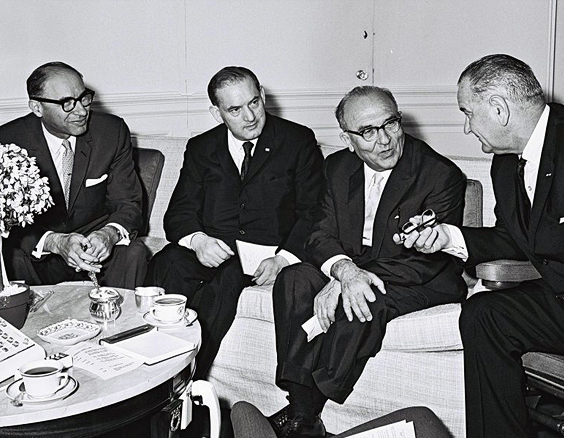November 10, 2020
Avner Cohen
After Harvard professor Henry Kissinger met with top Israeli officials in January 1965, he told US diplomats at the Embassy in Tel Aviv of his near certainty that Israel had begun a nuclear weapons project, according to a record of the meeting, which has recently been declassified and published for the first time by the National Security Archive. Kissinger added that Israeli scientists were “very certain that such weapons were necessary and that they knew how to make them.”

From right to left: U.S. President Lyndon B. Johnson, Israeli Prime Minister Levi Eshkol, Israeli Ambassador to the United States Avraham Herman, and Adviser to President Meyer “ Mike” Feldman.
A new publication, edited by Avner Cohen and William Burr, is the latest by the Nuclear Vault project focusing on Israel’s nuclear program, consists of 32 documents about the Dimona inspections. One section of the posting covers the Johnson administration’s efforts to convince Eshkol to let Washington assure Egyptian President Gamal Abdel Nasser of the results of the inspections: that Dimona was a peaceful project. Eshkol strongly objected because he wanted to keep Nasser guessing, but Johnson believed that assurances were necessary to keep the peace.
With rare exceptions, such as the astute Embassy Tel Aviv science attaché, Robert Webber, officials in the Lyndon Johnson administration believed incorrectly that the Israelis did not have plans underway to produce plutonium for weapons. Johnson, like his predecessor John F. Kennedy, insisted on inspections of the Dimona complex to verify Prime Minister Levi Eshkol’s pledge that Dimona was for peaceful purposes only. Indeed, US inspectors uncovered no evidence of weapons work in 1964 and 1965 but believed that future regular inspections were essential.
Continue reading at the National Security Archive.
